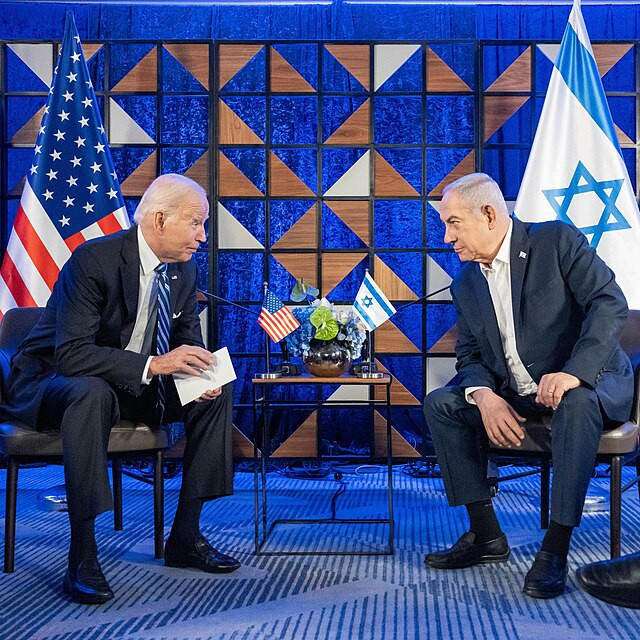The Biden administration has announced plans to adjust the U.S. military's force posture in the Middle East following escalating violence between Israel and Hezbollah militants in Lebanon. The decision comes in the wake of a targeted Israeli airstrike in Beirut, which reportedly aimed at senior Hezbollah leadership. This recent surge in violence has heightened concerns of a broader regional conflict, prompting the White House and Pentagon to reassess U.S. military involvement in the area.
White House officials confirmed on Friday that President Joe Biden directed the Pentagon to "assess and adjust as necessary U.S. force posture in the region to enhance deterrence, ensure force protection, and support the full range of U.S. objectives." This includes taking all appropriate measures to protect U.S. embassies in the region, which have been placed on high alert amid the deteriorating security situation. Biden was briefed multiple times throughout the day, with Vice President Kamala Harris also receiving updates.
The recent Israeli airstrike in Beirut has drawn significant international attention, especially given its timing and potential consequences. The operation, which targeted Hezbollah's central headquarters, came just hours after Israeli Prime Minister Benjamin Netanyahu delivered a speech at the United Nations General Assembly, during which he reaffirmed Israel's intent to continue its military operations against Hezbollah. Netanyahu emphasized that Israel is defending itself following the deadly attacks by Hamas militants on October 7, which were followed by a series of retaliatory strikes across Gaza and southern Lebanon.
The United States, however, maintained that it had no prior knowledge of the Israeli strike, despite claims from Israeli officials suggesting otherwise. President Biden, addressing the press on Friday, stated that "the United States had no knowledge of or participation in the IDF action." Pentagon deputy press secretary Sabrina Singh echoed Biden's remarks, clarifying that U.S. Defense Secretary Lloyd Austin only spoke with his Israeli counterpart, Yoav Gallant, once the operation was already underway. Singh emphasized that the conversation did not constitute advance notice and added that the U.S. government is still gathering more information about the situation.
U.S. Secretary of State Antony Blinken also weighed in, describing the moment as "precarious" for both the Middle East and the broader international community. At a press conference later on Friday, Blinken warned that the path forward for the region remains fraught with danger. "Israel has the right to defend itself against terrorism," Blinken said, "but the way it does so matters." He stressed that the decisions made by all parties involved in the coming days will have profound consequences, potentially leading to more conflict and suffering. Blinken also reiterated the U.S. stance that a cease-fire in Gaza is in Israel's best interest, suggesting that the military objectives Israel had set out to achieve had largely been accomplished.
The Israeli strike on Hezbollah's central headquarters in Beirut has resulted in significant casualties. Lebanese health officials reported that hundreds have been killed in Lebanon over the past week due to the ongoing strikes, with more than 100,000 people displaced. In the aftermath of Friday's bombing, there were conflicting reports about whether Hezbollah leader Hassan Nasrallah had been killed. Israeli officials have neither confirmed nor denied his death, with Netanyahu reportedly responding to questions about Nasrallah's status with a gesture indicating patience.
This escalation in violence comes as part of a broader conflict between Israel and Iran-backed groups, including Hezbollah in Lebanon and the Houthi rebels in Yemen. Both groups have launched attacks on Israeli territory in recent weeks, and Hezbollah's involvement has added a new layer of complexity to an already volatile situation. The potential for the conflict to spiral into a full-blown regional war has alarmed many in the international community, with European leaders, including French President Emmanuel Macron, calling for restraint and an immediate cease-fire. Macron expressed shock at the number of civilian casualties and warned against Lebanon becoming "another Gaza," a reference to the devastating humanitarian crisis unfolding in Gaza as a result of Israel's military campaign.
Despite international pressure, Netanyahu has signaled that Israel will continue its operations unabated, viewing Hezbollah as a significant threat to national security. During a meeting with Jewish-American officials on Friday, Netanyahu hinted that more decisive actions could be taken in the coming days. His administration remains committed to protecting Israeli civilians from Hezbollah's rocket attacks, which have continued despite the escalating violence.




